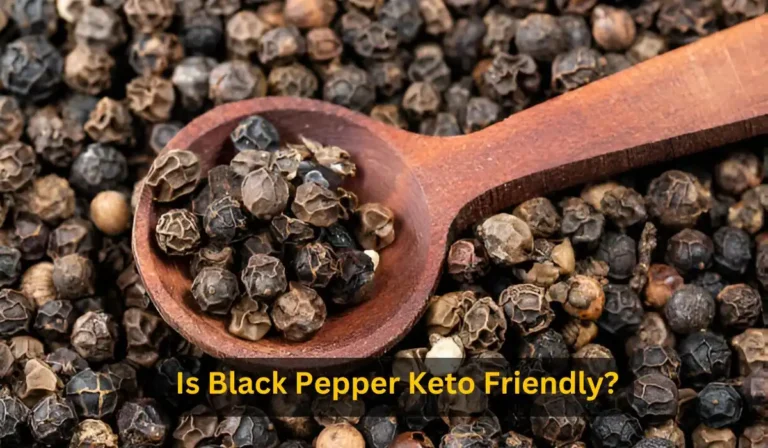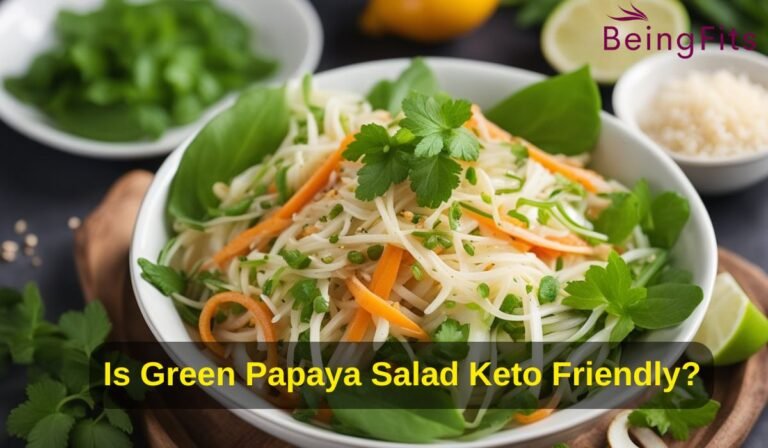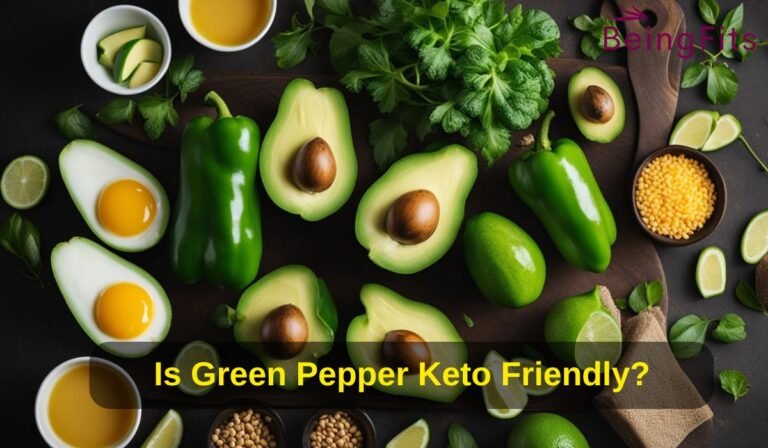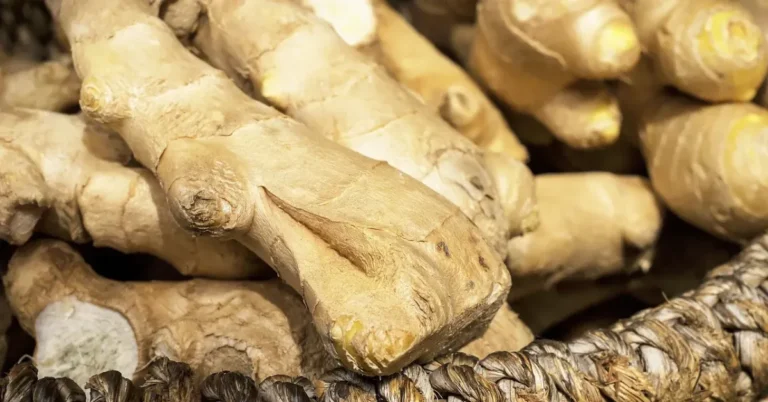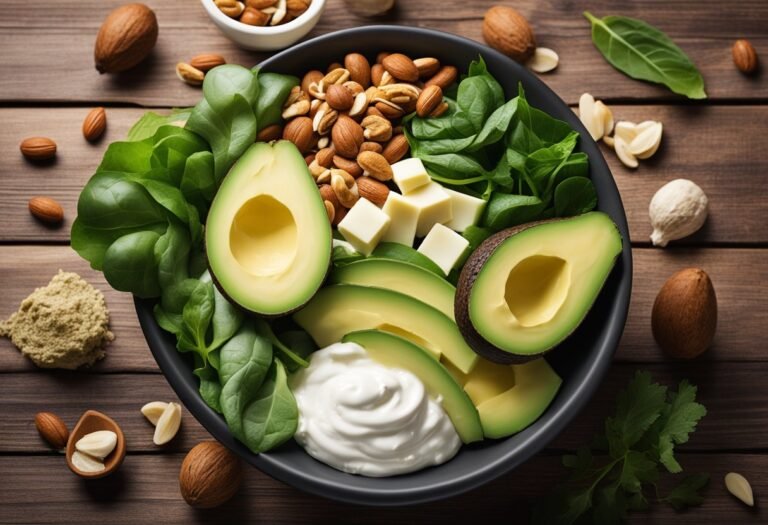Best Peanut Butter For Keto Diet | Top 5 Brands in 2024
Are you on a keto diet and searching for the best peanut butter for Keto Diet? Look no further!
In this article, we’ll explore the top five peanut butter brands perfect for your keto diet. From brands renowned for their low-carb content to those praised for their natural ingredients, we’ve got you covered.
Expect to find detailed reviews, nutritional information, and expert recommendations to help you pick the best option.
So, Let’s Get Started.
What is The Keto Diet & How Does it Work
The ketogenic diet, also known as the ‘keto’ diet, has gained popularity as a way of eating that involves consuming a very low amount of carbohydrates.
When following this plan, carbohydrates are replaced by fat for energy, with the goal of promoting the body’s fat-burning process.
There are several versions of this diet, but the one with the most research behind it is the ‘standard keto diet’.
Initially used to treat drug-resistant epilepsy in children because it seems to reduce the frequency and intensity of seizures, the diet gained mainstream attention when people realized its potential for weight loss.
The aim of diets with a strict carb component is to induce the body into a state of ‘ketosis’. Diets that follow this approach include the Atkins diet, the Dukan diet, and LCHF (low carb, high fat) diets such as the Banting diet.
These diets vary in their ratios of fat, protein, and carbs, as well as other specific features. The keto diet is distinct due to its high-fat content with only moderate amounts of protein.
Nutritional Profile of Peanut Butter
Best Peanut Butter For Keto
Protein Content: Peanut butter serves as a commendable protein source, offering approximately 22.5 grams of protein per 3.5-ounce (100-gram) serving. This constitutes about 14% of its total calorie content. Despite its richness in protein, peanut butter is deficient in the essential amino acid methionine, a factor to consider for balanced nutrition.
Carbohydrate Composition: With only 20% of its composition consisting of carbohydrates, peanut butter is an ideal option for individuals adhering to low-carb diets. Within this carbohydrate content, 5 grams are fiber, enhancing its nutritional value and contributing to digestive health.
Fat Content: High in fat, peanut butter contains 51 grams of fat per 3.5-ounce (100-gram) serving, comprising approximately 72% of its total calorie content. The predominant fat present in peanut butter is oleic acid, a monounsaturated fat associated with various health benefits, including improved insulin sensitivity.
Vitamins and Minerals: Peanut butter offers a diverse array of essential vitamins and minerals. Notably, a 3.5-ounce (100-gram) serving provides:
- Vitamin E: 60% of the daily value (DV)
- Vitamin B3 (niacin): 84% of the DV
- Vitamin B6: 29% of the DV
- Folate: 18% of the DV
- Magnesium: 37% of the DV
- Copper: 56% of the DV
- Manganese: 65% of the DV
It also contains notable amounts of biotin, vitamin B5, iron, potassium, zinc, and selenium, contributing to overall nutritional intake.
Antioxidant Content: Rich in antioxidants such as p-coumaric acid and resveratrol, peanut butter offers potential health benefits. These antioxidants have been associated with reduced risk of arthritis and cardiovascular diseases in various animal studies.
Aflatoxin Consideration: While peanut butter boasts significant nutritional value, it’s essential to acknowledge the potential presence of aflatoxins, harmful substances produced by molds such as Aspergillus. However, proper processing significantly reduces aflatoxin levels, and regulatory bodies closely monitor peanut products to ensure safety.
Criteria for Choosing Keto-Friendly Peanut Butter
1. Low Carb Content
Opt for peanut butter with a minimal carbohydrate content to align with a ketogenic diet. Look for options that contain fewer than 5 grams of net carbs per serving, ensuring that most of the carbohydrates come from fiber rather than added sugars.
2. High-Fat Content
Choose peanut butter varieties that are rich in healthy fats, as fat is a primary component of a ketogenic eating plan. Seek products with a high-fat content, preferably consisting of at least 70% of calories derived from fats. This ensures that the peanut butter provides a substantial source of energy while keeping carbohydrate intake low.
3. Natural Ingredients
Prioritize peanut butter made from natural ingredients to avoid added sugars, preservatives, and hydrogenated oils. Opt for products that contain only peanuts (and possibly salt) without any additional fillers or artificial additives. Reading the ingredient list is crucial to ensure that the peanut butter meets your keto dietary requirements and promotes overall health.
5 Best Peanut Butter Brands in 2024
Following a keto diet requires choosing the right foods. Peanut butter, with its high-fat and low-carb content, can be a great addition. Here, we list the top five peanut butter brands for the keto diet in 2024.
1. Skippy Super Chunk Peanut Butter
- NUTRITION: (Per 2 Tbsp)
- CALORIES: 190
- FAT: 16 g (Saturated Fat: 3 g)
- SODIUM: 125 mg
- CARBS: 6 g (Fiber: 2 g, Sugar: 3 g)
- PROTEIN: 7 g
Skippy Super Chunk Peanut Butter stands out with its audacious name and unmistakable presence on the grocery store shelves. Priced at $3.49 for a 16.3-ounce jar, it’s a choice that promises substantial peanut chunks and bold flavor.
Appearance: Upon opening the jar, it’s evident that this peanut butter lives up to its name. Generous chunks of peanuts adorn the spread, even towards the bottom, offering a delightful visual and textural experience.
Flavor: True to expectations, Skippy Super Chunk delivers a bold and rich peanut taste, complemented by hints of sweetness. Despite its chunky texture, the butter maintains a consistently pleasant mouthfeel, making it enjoyable as a standalone snack. With each spoonful, satisfaction is guaranteed, making it a brand worth indulging in.
2. 365 by Whole Foods Market Organic Creamy Peanut Butter
- NUTRITION: 2 tbsp (32g)
- CALORIES: 190
- Fat: 16g
- SODIUM: 0 mg
- PROTEIN: 8 g
365 by Whole Foods Market Organic Peanut Butter” offers a delicious and wholesome option for peanut butter enthusiasts. Made from organically sourced peanuts, this product boasts a natural flavor without any artificial additives or preservatives.
Whether spread on toast, used in recipes, or enjoyed straight from the jar, it provides a satisfying blend of nutty taste and creamy texture.
As part of Whole Foods’ commitment to quality and sustainability, this peanut butter aligns with their ethos of offering organic, ethically sourced products to consumers.
With its simple ingredients and rich flavor, it’s a pantry staple for health-conscious individuals seeking a tasty and nutritious option.
3. Kroger Crunchy Peanut Butter
- NUTRITION: (Per 2 Tbsp)
- CALORIES: 180
- FAT: 15 g (Saturated Fat: 2 g)
- SODIUM: 150 mg
- CARBS: 7 g (Fiber: 2 g, Sugar: 4 g)
- PROTEIN: 7 g
Introducing Kroger Crunchy Peanut Butter, a delicious and nutritious spread that’s perfect for any peanut butter lover. Packed with flavor and texture, each serving provides 180 calories and 15g of fat, including just 2g of saturated fat.
With 7g of protein per serving, it’s a satisfying snack or addition to your favorite recipes. Plus, it’s low in sodium with only 150mg per serving and contains 2g of fiber to support a balanced diet.
Enjoy the crunchy goodness of Kroger Crunchy Peanut Butter as a tasty and convenient option for your snacking and cooking needs.
4. Justin’s Classic Peanut Butter
- NUTRITION: (Per 2 Tbsp)
- CALORIES: 210
- FAT: 18 g (Saturated Fat: 3.5 g)
- SODIUM: 25 mg
- CARBS: 6 g (Fiber: 1 g, Sugar: 2 g)
- PROTEIN: 7 g
Justin’s Classic Peanut Butter Spread boasts being “naturally delicious,” though I couldn’t confirm the delicious part as I picked up the 16-ounce jar priced at $5.79.
It’s definitely natural, made with dry-roasted peanuts and palm oil. Alongside peanut butter, Justin’s offers almond butter, nut butter cups, and chocolate candy pieces under its sweet and salty umbrella.
Appearance-wise, there’s a thin layer of peanut oil on the top—a common phenomenon in natural peanut butter. It’s also filled with tiny peanut fragments. Upon checking the label, I realized it’s not technically labeled as “creamy,” which surprised me.
In terms of taste, it’s both natural and neutral. It feels high quality, free from excess sugars or sodium. What you see is what you get, with a flavor resembling pounded goobers. It’s neither particularly good nor bad. My only issue lies with its gritty, almost sand-like texture.
5. Jif Natural Crunchy Peanut Butter
- NUTRITION: (Per 2 Tbsp)
- CALORIES: 190
- FAT: 16 g (Saturated Fat: 3.5 g)
- SODIUM: 65 mg
- CARBS: 8 g (Fiber: 3 g, Sugar: 3 g)
- PROTEIN: 7 g
Growing up, Jif reigned supreme in our household. A trusty red-capped jar of its smooth variant was a permanent fixture in our pantry, and I’ve remained loyal to the brand ever since. But, being a creature of habit, I decided it was time for a change.
So, I opted for a crunchy jar from their Natural range, stepping out of my creamy comfort zone. This 16-ounce adventure set me back $3.19.
Appearance-wise, it’s a dense affair, teeming with peanuts of various sizes. Some are hefty halves, while others are mere specks. Towards the bottom, though, the peanut party starts to thin out. A rocky start, indeed.
As for the taste, it’s a trio of sugar, molasses, and salt dancing on my palate. Yet, if you’d told me it was just peanuts upon peanuts in that jar, I’d have bought it.
Every lick (or bite) exudes pure nuttiness, akin to chomping on ballpark peanuts, shells and all. It seems my family had it right all those years ago. Creamy Jif it is, and creamy Jif it shall remain.
How to Make the Best Homemade Keto Peanut Butter
Today, we’re going to walk you through a simple recipe to create the best homemade keto peanut butter. And to make things even easier, we’ve attached a helpful video tutorial for visual guidance.
Ingredients:
- 2 cups of dry roasted peanuts (unsalted)
- 2 tablespoons of coconut oil (or MCT oil for an extra keto boost)
- 1 tablespoon of powdered erythritol (or your preferred keto-friendly sweetener, optional)
- A pinch of salt (optional, adjust to taste)
Instructions:
- Prepare the Peanuts: Start by adding the dry roasted peanuts to a high-powered blender or food processor. Ensure that your peanuts are unsalted to maintain control over the salt content.
- Blend Until Smooth: Begin blending the peanuts at a low speed, gradually increasing to high. Scrape down the sides of the blender or food processor as needed to ensure an even consistency.
- Add Coconut Oil: Once the peanuts start to break down and resemble a thick paste, add in the coconut oil. This step helps to create a smoother texture and adds healthy fats, perfect for a ketogenic diet.
- Sweeten (Optional): If you prefer a slightly sweet peanut butter, you can add powdered erythritol or your chosen keto-friendly sweetener at this stage. Adjust the sweetness to suit your taste preferences.
- Adjust Salt: For that classic peanut butter flavor, you can add a pinch of salt to enhance the taste. However, this step is entirely optional, especially if you’re watching your sodium intake.
- Blend Until Desired Consistency: Continue blending until you achieve your desired consistency. Some prefer a smooth and creamy peanut butter, while others enjoy a slightly chunky texture. Feel free to blend accordingly.
- Store in an Airtight Container: Transfer your homemade keto peanut butter to an airtight container or jar. It can be stored at room temperature for up to two weeks or refrigerated for longer shelf life.
Or Watch this Video:
Is Peanut Butter Healthy For Weight Loss
Peanut butter is high in protein, aiding weight loss, but it is rich in calories, so it can help you gain weight if you consume too much of it. Nuts are some of the healthiest things you can eat, providing proteins, healthy fats, and a range of vitamins and minerals.
Is Peanut Butter Keto Friendly?
Yes, peanut butter can indeed be part of a keto diet, but with some caveats. It’s crucial to opt for plain varieties, devoid of extra flavors and sweeteners.
Almond butter emerges as an equally suitable alternative, boasting slightly fewer carbs.
However, regardless of your choice, mindful consumption remains paramount, especially if weight loss is your goal.
Learn More: Is Pineapple Keto Friendly?
Alternatives to Peanut Butter on a Keto Diet
On a keto diet, you’ll want to focus on foods that are low in carbohydrates and high in healthy fats. Here are some alternatives to peanut butter that you can enjoy:
- Almond Butter: Almond butter is a popular alternative to peanut butter and is lower in carbohydrates. Look for varieties without added sugars.
- Sunflower Seed Butter: Made from ground sunflower seeds, sunflower seed butter is another excellent option. It has a slightly different flavor than peanut butter but is still delicious.
- Cashew Butter: While cashew butter is slightly higher in carbohydrates than almond butter, it can still be enjoyed in moderation on a keto diet.
- Macadamia Nut Butter: Macadamia nuts are very low in carbohydrates and high in healthy fats, making macadamia nut butter a great choice for keto.
- Coconut Butter: Coconut butter is made from pureed coconut meat and is rich in healthy fats. It has a slightly sweet taste and can be used as a spread or in cooking and baking.
- Pecan Butter: Pecans are low in carbohydrates and high in healthy fats, making pecan butter a keto-friendly option.
- Hazelnut Butter: Hazelnut butter, also known as “nutella” without the added sugar, can be a delicious alternative to peanut butter. Just make sure to choose a variety without added sugars.
- Sesame Seed Butter (Tahini): Tahini is made from ground sesame seeds and is a staple in Middle Eastern cuisine. It’s rich in healthy fats and has a unique, nutty flavor.
Related: Is Cream Cheese Keto Friendly?
Health Benefits of Peanut Butter on Keto
1. Satiety and Weight Management
Peanut butter’s high-fat content contributes to feelings of satiety, helping individuals feel full and satisfied after consuming it. This can aid in weight management by reducing overall calorie intake and preventing overeating.
2. Energy Boost
The fats in peanut butter serve as a quick source of energy for the body, making it an ideal snack option for individuals following a keto diet. Additionally, peanut butter can help stabilize blood sugar levels, preventing energy crashes commonly associated with fluctuations in blood glucose.
3. Nutrient Density
Peanut butter contains essential nutrients such as vitamin E, magnesium, and fiber. These nutrients play crucial roles in supporting various bodily functions, including immune function, muscle function, and digestive health, making peanut butter a nutrient-dense food choice.
4. Heart Health
Despite being high in fat, peanut butter primarily consists of heart-healthy monounsaturated fats. Consuming these fats can help reduce levels of bad cholesterol (LDL cholesterol) in the blood, thereby lowering the risk of cardiovascular diseases such as heart attack and stroke.
5. Muscle Building and Repair
Peanut butter is not only rich in fats but also contains a considerable amount of protein. Protein is essential for muscle building and repair, making peanut butter an excellent post-workout snack option for individuals following a keto diet.
FAQs
[sp_easyaccordion id=”3309″]







